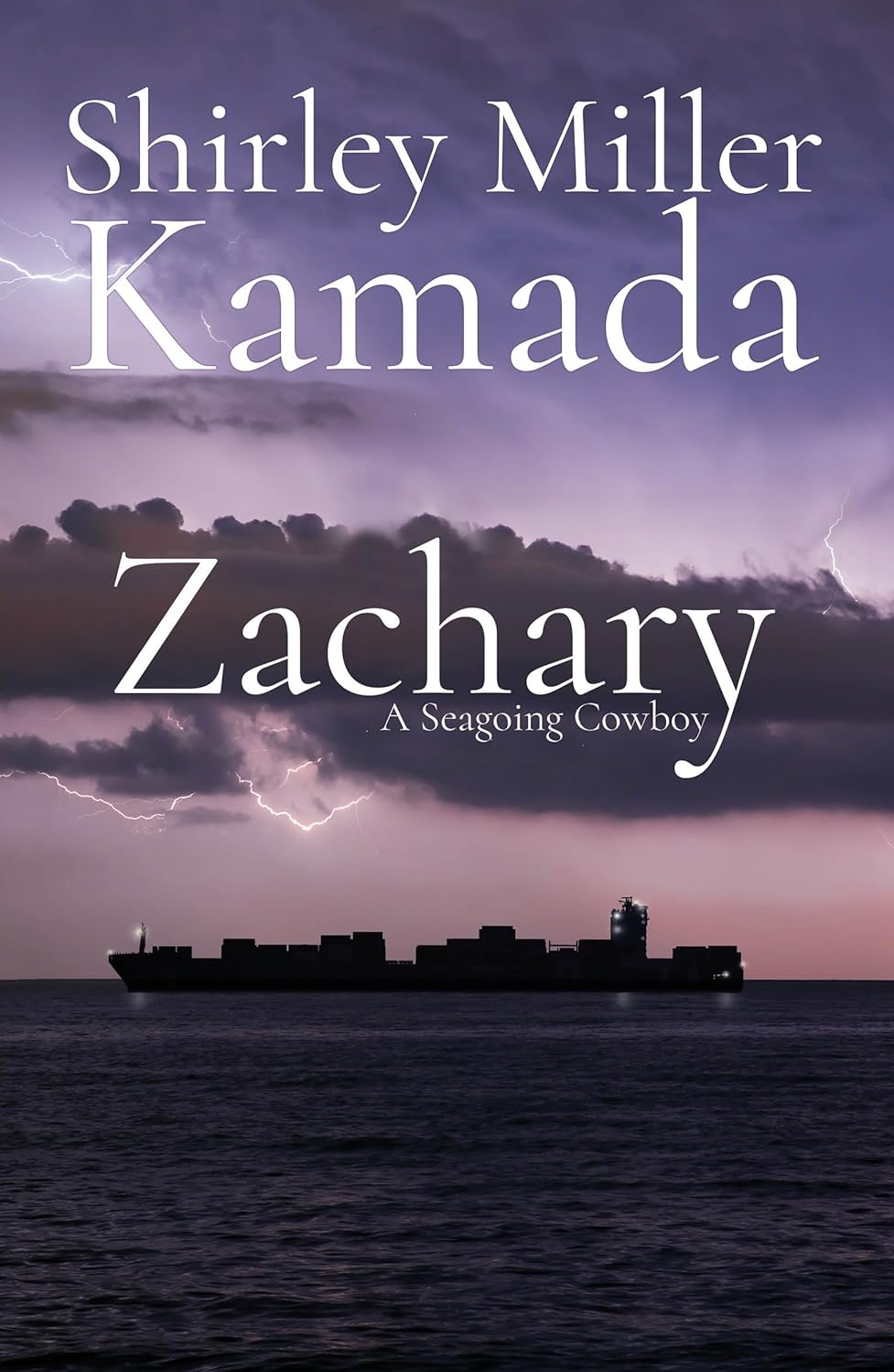Publisher: Black Rose Writing |
Publication Date: August 14, 2025 |
Format: Paperback |
ISBN: 978-1685136406 |
Price: $16.95 |
Genre: Historical Fiction | YA
Page count: 136 |
Zachary Whitlock knows sheep. He knows farming and knows what it’s like to have his best friend forced into an internment camp for Japanese Americans. What he does not know much about is goats and traveling by sea on cargo ships, yet he makes a decision to go with a group of volunteers to Japan to help deliver a herd of more than two hundred goats, many of which are pregnant, to survivors of the U.S. bombing of Hiroshima and Nagasaki. Goats provide much-needed milk and nutrition, and people living in the bombed ruins are sick and hungry. What he also does not know at the age of seventeen, is what it means to be seasick, how to navigate the personalities of seasoned seamen, and how to keep not only goats but himself alive during a typhoon. A fascinating follow-up to NO QUIET WATER, Shirley Miller Kamada’s well-received novel about the WWII internment era, ZACHARY: A SEAGOING COWBOY is a story full of adventure, human connection, and a young man’s coming of age.
A COMPANION STORY TO NO QUIET WATER–SUITABLE FOR THE ENTIRE FAMILY

Shirley Miller Kamada is a former educator, education director, and bookstore owner. She lives in Moses Lake, Washington, with her husband Jimmy and their two small, adopted dogs, Priscilla, and Phoenix.
KIND WORDS FOR ZACHARY: A SEAGOING COWBOY
“This sequel to No Quiet Water gently addresses for young readers the injustices of war. Transporting us this time to Japan, Zachary’s goodwill mission brings him face to face with the emotional and physical realities of the aftermath of war.”
–Peggy Reiff Miller, Heifer Project historian and author of The Seagoing Cowboy
A powerful coming-of-age tale about a young Quaker boy who sails across the Pacific bringing hope to postwar Japan—but ultimately confronts both the scars of war and the prejudice still lingering not just at home, but on the ocean between the two countries.
–Cam Torrens, bestselling author of the TYLER ZAHN mystery series
Hopeful, heartening, yet searing, Zachary: A Seagoing Cowboy is a gentle poem of a book, illuminating aspects of an era we may think we know well. As she did in No Quiet Water, author Shirley Miller Kamada reminds us the cost of World War II was born not just by the soldiers on the field, but by the civilians caught in the conflagration.
—Pamela Norsworthy, Author of War Bonds and The Florentine Entanglement
“…an earnest, well-researched novel and a worthy exploration of an often overlooked piece of history.”
—Kirkus Reviews
INTERVIEW WITH SHIRLEY MILLER KAMADA
Tell us a little bit about yourself.
I enjoyed my work in the classroom as a public school teacher, as director of a private learning center, and wearing many hats as owner of a small, independent bookstore/espresso café. I live on the lakeshore in Moses Lake, Central Washington, with my husband Jimmy and our two small, adopted dogs, Priscilla and Phoenix.
What inspired the writing of Zachary: A Seagoing Cowboy?
After publishing my first book, No Quiet Water, I was often asked, “What about Zachary? How did the events of World War II affect his life?” I was drawn to Zachary Whitlock, also, to his sense of responsibility to his family and his community, his willingness to work hard, his curiosity. Writing this novella gave me an opportunity to delve further into his interests and motivations, his intelligence, curiosity, and compassion.
I came to know of Floyd Schmoe, a man with a strong sense of justice who gave much of his time visiting internment camps, personally surveying the conditions to which wrongly imprisoned Japanese Americans were subjected. Looking further into the activities of the American Society of Religious Friends, I found that they helped connect incarcerees with legal assistance, accomplish banking tasks, and sometimes brought needed supplies to the camps. When I learned that after the war Floyd Schmoe had taken charge of a mission to Japan with what was then known as the Heifer Project, the connection was made—in my mind and my heart. The story took on a shape, and grew, with a mission of its own.
What in your life prepared you to write a story like Zachary?
I grew up on a farm in eastern Colorado near Weldona. We raised sheep and chickens. Watching farm families work from dawn to dusk and at times into darkness in the beam of tractor headlights had a strong impact on me. I think I realized from a very young age that hard work was the solution to most human problems.
The men in my family were proficient mechanics and builders. My Grandfather Miller repaired equipment. His two sons—my father and uncle—accomplished the farming with the help of hired hands. On the farm in Weldona, we had a neighbor very, very much like Mr. Harvey. Their example of what it meant to possess a strong work ethic likely influenced my approach to academics, as I completed high school a year early by taking a correspondence course, just as Zachary did.
While I finished high school by correspondence, my father took a job working for a company that built churches. He supervised the construction of four or five buildings simultaneously and traveled from one job to another, frequently half a state away. My parents and I lived in a camper, the kind that fits in the box of a pickup truck. My mother was good at organizing lots of necessities in a very small space. My parents slept in the cabover. I slept in the dinette, which when disassembled could be fit with a small mattress. When my brother was home from college for the summer, he slept on the concrete floor of a room in a church under construction. Before moving from one job site to another it was imperative to remember to secure all the moving parts, for instance the small television set that fit into a cabinet.
During these years I developed a strong appreciation for strident effort and personal responsibility and may have influenced my decision to join a student Mission Corps under the auspices of which I spent two months in Barbados between my sophomore and junior years of college.
Zachary is a novella, whereas your previous book, No Quiet Water, was a full-length novel. How was the experience of writing a shorter piece different? Do you now prefer one over the other when it comes to the writing process?
As our platforms for reading material change, and the challenges to people’s time for reading increase, those factors might influence my decision as far as the total length of a book/story, and perhaps in the length of chapter, number of characters. Really, the questions I must ask myself are how is the message is best conveyed? How many characters must I include? Is the story about who or what? What can I/must I leave out and still render a satisfying, fulfilling story? One advantage of the novella is that the style can be spare, requiring fewer segues or major transitions, but that doesn’t make it any less intimidating at the start. Less space to play with translates to more finessing, in my experience.
What to you is the most unusual thing about Zachary? What might make the book stand out to readers?
Strange to say, the location, because Bainbridge Island is the perfect place for the story. But when I first shared information about the story I was working on in workshops I heard, “Oh, you can’t do that. Snow Falling on Cedars features Bainbridge Island. You can’t write a book set on Bainbridge Island. I have since heard the complaint, again in workshops—”Must all books about the history of Japanese American people on the West Coast be set on Bainbridge Island?”
But I knew the people and the families in the story and the sort of activities that would fill their days well before I knew “where.” I knew there must be farming. I wanted sheep and lambs, planning that the neighbors, the Whitlocks, would raise them. I could plainly “see” Mrs. Whitlock combing wool and spinning yarn. I knew raising chickens had to be part of daily life. Mr. Whitlock (actually Reverend Whitlock; Mrs. Whitlock was a minister also, which is not unusual in the Friends Church) wrote textbooks used in colleges classes. I could see him at his desk, working after dark by lamplight.
I knew Fumio Miyota (my husband’s given name is Fumio) and his family would be caught up in the internment.
I’d attended a weekend writing workshop on Bainbridge Island and was intrigued by the ferry ride, the landscape, the climate. I called the Chamber of Commerce and, feeling a bit silly, asked the woman who answered the phone if anyone raised sheep on Bainbridge Island. It makes me laugh to think of it now. But she answered, “Oh, yes!” and gave me a few names I could find on the internet. So, the Miyotas farmed and the Whitlocks raised sheep on Bainbridge Island.
I did not know when I began researching that Japanese Americans on Bainbridge Island were the first to be incarcerated. I did not know they were transported to Manzanar, in California. I’d fully intended to write about the Miyotas being taken to Idaho. I asked myself, did the Miyotas have to farm on Bainbridge Island? But yes. They did. And that required that I pivot, required that I research two internment camps instead of one.
The Whitlocks were, in belief and practice, apolitical Conscientious Objectors. How did that shape the family’s lives and their relationships with their community? Writing this novella made me thinking more about that. Just exactly what is our obligation to others? Does that obligation outweigh our own beliefs—especially if to meet that obligation forces us to counter those beliefs?
What do you like best about the story?
Zachary is a deep thinker and considers many sides to every issue. He shows solid values, many of which were learned in his family and from the Religious Society of Friends. A good work ethic, appreciation for non-violent problem-solving, respect (when it’s due).
What was your journey to publication like? Can you talk about this and share your insights with anyone looking to have a book published?
There’s a broad chasm between writing and seeking publication. Once a book is written, if one hopes for a large readership, one looks for an agent. An agent isn’t just looking for a good story, but a story with punch, verve, and elements unique enough to draw the attention of a media-sated audience—usually that means the subject matter is in some way timely. Publishing is a maze, an obstacle course, and success requires timing and some luck. So write something you care about. A lot. Or write for yourself, write what you want to read. Either is all right, and either way, the road to publication is all about revision and perseverance, and perhaps a belief in the value of what you’ve written.
Talk to us about the writing process. If you were speaking to someone who wanted to know how to write a book, what would you tell them?
It’s common to answer that question with, “If you want to write, read,” and that’s acceptable, but more accurate is, “If you want to write, think.” Consider the people around you, why do they do what they do, and how do their actions affect their lives?
Think about your own life. What were pivotal moments? What if you had taken a different path? Are you happy with how your life has turned out? The answer: Whether you are or are not, you can write and experience as you do so a different life. In fact, several different lives.
Talk about the writing life in general. What advice do you have for writers setting out on the path to writing a book. What are your best strategies for starting and keeping going?
For me, it’s as simple as write. Keep writing. Understand that not only writing that leads to publication is important/deserves a place in your life. You might find your way with a compass. You might find yourself with a pencil. Write on the backs of envelopes, on old sacks, napkins, the white spaces of magazine advertisements. Don’t begrudge yourself time to write. Write.
Beyond that, you must be prepared to promote your book. It doesn’t hurt to start strategizing before you even begin writing, because someone is going to ask you that very question. You might contract with an agency to publicize it, but in the end you must get into the promotion of it yourself in some way.
What has your writing journey been like? When did you start writing? Did you do an MFA or other professional writing program?
No MFA or well-known programs. I did participate in a continuing ed short course. The professor was a well-known writer, and she was interesting, but not particularly helpful. She preferred that her students write what she wanted to read.
I frequently wrote poems for my students’ penmanship practice for use in place of what was provided in the curriculum which was often boring.
Links
Website: ShirleyMillerKamada.com
Publisher: Black Rose Writing
Twitter: @shirleymkamada
Instagram: shirleymkamadaauthor

